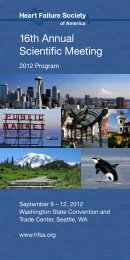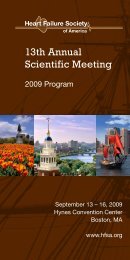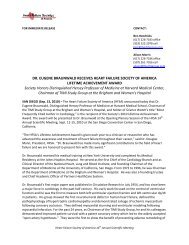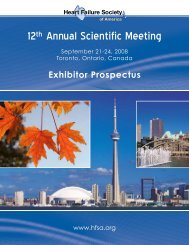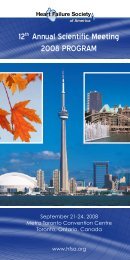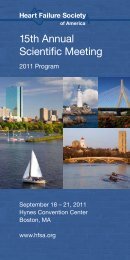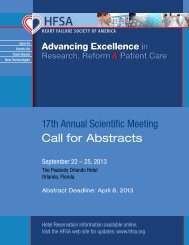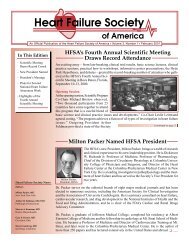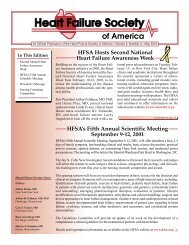Kanu Chatterjee Receives 2009 HFSA Lifetime Achievement Award ...
Kanu Chatterjee Receives 2009 HFSA Lifetime Achievement Award ...
Kanu Chatterjee Receives 2009 HFSA Lifetime Achievement Award ...
You also want an ePaper? Increase the reach of your titles
YUMPU automatically turns print PDFs into web optimized ePapers that Google loves.
Heart Failure Society News December <strong>2009</strong><br />
Highlights from the 13th Annual Scientific Meeting<br />
Opening Session – Personalized Medicine: The Dawn of a New Era<br />
The Opening Plenary session presented<br />
three different perspectives on the<br />
application of genetic information and<br />
testing to better understand complex<br />
human disease and personalize<br />
medicine. David A. Schwartz (Denver,<br />
CO), an expert on pulmonary disease,<br />
addressed the role of the epigenome<br />
in the development of disease. One<br />
important aspect of personalized<br />
medicine is how the environment is<br />
altering biology and therefore affecting<br />
the risk of developing disease. Schwartz<br />
explained that the field of epigenetics<br />
concerns the mechanisms that control<br />
gene regulation and transcription. These<br />
epigenetic mechanisms can be altered by the<br />
environment or inherited from one generation<br />
to the next. The goal is to measure these<br />
epigenetic marks in patients and use them<br />
to identify individuals who may respond to<br />
certain medications.<br />
Atul J. Butte (Palo Alto, CA) discussed<br />
translational bioinformatics. There are now<br />
approximately 350,000 publicly available<br />
microarrays, a number that should double or<br />
triple each year. This easily-searched data is<br />
leading to a new taxonomy of disease based<br />
on genomics.<br />
David E. Duncan, a journalist, (Berkley,<br />
CA) anchored the session by recounting<br />
his experiences in the “Experimental<br />
Man” project in a talk, “One Man’s Quest<br />
for Personalized Medicine.” The project<br />
involved taking 320 tests, including<br />
genetic and gene expression tests that<br />
required having 2 liters of blood drawn<br />
and undergoing 22 hours of MRI scans.<br />
Baseline testing showed that Duncan was<br />
a healthy 51-year-old male. However,<br />
a battery of genetic tests indicated that<br />
Duncan was at a lifetime risk for several<br />
illnesses or events, including myocardial<br />
infarction and addiction. He learned<br />
he had a greater tolerance for caffeine,<br />
had a greater propensity for risk taking, and<br />
showed a high exposure to DDT. Duncan<br />
said his experiences underscored the need<br />
to standardize and organize the information<br />
better, since different companies showed<br />
different results.<br />
Oliver Smithies, PhD receiving 3rd Distinguished<br />
Lecture in Basic Science<br />
Excellence in Basic Science<br />
Oliver Smithies, PhD, co-recipient of the<br />
2007 Nobel Prize in Physiology or Medicine<br />
for work on gene modifications in mice<br />
through the use of embryonic stem cells,<br />
delivered the 3rd Distinguished Lecture in<br />
Basic Science. Following Smithies’ lecture<br />
were presentations on the current role of<br />
mouse models in cardiovascular research,<br />
current research in cardiac transgenesis, and<br />
the implications of biased signaling by G<br />
protein-coupled receptors for the treatment<br />
of patients with heart failure. The Special<br />
Sunday Session is the kick off for the basic<br />
science component of the annual meeting, and<br />
always features excellent speakers that attract<br />
a large audience.<br />
Insights from Recent Trials and Registries<br />
Key data and new insights from 4 recent<br />
trials and registries of heart failure therapies<br />
were discussed in a session focusing on<br />
implications for patient care. James K.<br />
Kirklin (Birmingham, AL) presented on the<br />
INTERMACS registry; David J. Whellan<br />
(Philadelphia, PA) presented HF-ACTION;<br />
Peter E. Carson (Washington, DC) discussed<br />
the I-PRESERVE trial; and Eric J. Velazquez<br />
(Durham, NC) presented the STICH trial.<br />
INTERMACS is a U.S. national registry for<br />
patients receiving mechanical circulatory<br />
support therapy for advanced heart failure.<br />
Registry data indicates that the strategy is<br />
increasingly to implant a temporary device<br />
before the patient is in cardiogenic shock<br />
and to do it as an elective procedure. Patients<br />
with an isolated LVAD have the best survival.<br />
However, there are still issues with long-term<br />
survival, and destination therapy currently does<br />
not look favorable. There is a clear movement<br />
from pulsatile to axial flow pumps.<br />
Most patients enrolled in ACTION-HF did not<br />
meet the exercise goal, but approximately 30%<br />
achieved or surpassed the target. When the<br />
results were adjusted for baseline prognostic<br />
factors such as EF, atrial fibrillation, and<br />
depression, there was a significant benefit, with<br />
greater exercise resulting in a greater benefit<br />
in terms of the primary end point. The study<br />
clearly demonstrated that exercise training for<br />
heart failure patients is safe.<br />
Approximately 50% of patients with heart<br />
failure have an ejection fraction of at least<br />
45%, but no pharmacological therapies have<br />
been shown to improve outcomes. Irbesartan<br />
did not improve outcomes in patients in<br />
the I-PRESERVE trial. Although mortality<br />
in the study was substantial, the change in<br />
Minnesota Living with Heart Failure scores<br />
was favorable.<br />
One of the objectives of the STICH trial was<br />
to compare surgical ventricular reconstruction<br />
(SVR) in addition to a coronary artery<br />
bypass graft (CABG) procedure to CABG<br />
alone. Results of the randomized study of<br />
1,000 patients found no differences between<br />
the 2 groups in death or cardiovascular<br />
hospitalization.<br />
3



